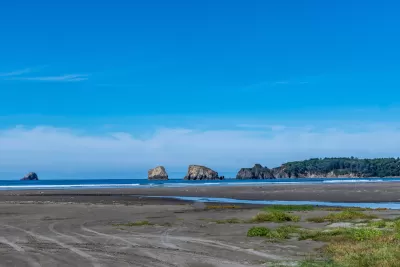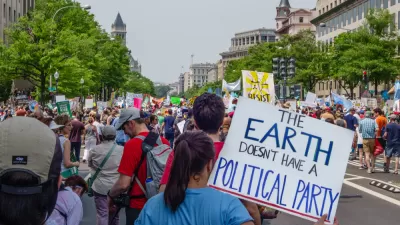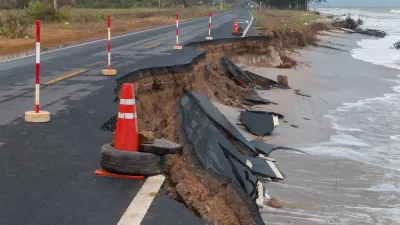Tribal communities threatened by climate change are opting to relocate or engage in ‘managed retreat’ to save their villages from sea level rise, erosion, flooding, and other climate impacts.

Eleven tribal communities have received federal relocation grants to help them move to safety to avoid the impacts of climate change, reports Kristi Eaton in the Daily Yonder.
The grants, which are worth $5 million each, are earmarked for communities facing significant and widely varied climate risks, including coastal and riverine erosion, permafrost degradation, wildfire, flooding, food insecurity, sea level rise, hurricane impacts, potential levee failure, and drought.
The grants are funded through the Bipartisan Infrastructure Law, “which provides a total of $466 million to the Bureau of Indian Affairs (BIA) over five years, including $216 million for climate resilience programs,” Eaton explains. “The Inflation Reduction Act provides BIA with an additional $220 million for climate adaptation and resilience, of which the Department anticipates spending $40 million to support voluntary community-driven relocation efforts, with the remainder supporting broader Tribal climate resilience activities.”
The Alaskan village of Newtok, one of the grant recipients, “decided to relocate in 1994 after a decade of trying to address the community’s erosion threat by other means of mitigation.” Another Alaskan village, Napakiak, “is conducting a managed retreat, which is different from a relocation,” in that threatened homes are moved to nearby locations adjacent to the current community. The grants aim to help communities figure out their best action plan for mitigating climate impacts and relocating when necessary.
FULL STORY: Tribal Nations Receive Relocation Grants to Escape the Effects of Climate Change

Planetizen Federal Action Tracker
A weekly monitor of how Trump’s orders and actions are impacting planners and planning in America.

San Francisco's School District Spent $105M To Build Affordable Housing for Teachers — And That's Just the Beginning
SFUSD joins a growing list of school districts using their land holdings to address housing affordability challenges faced by their own employees.

The Tiny, Adorable $7,000 Car Turning Japan Onto EVs
The single seat Mibot charges from a regular plug as quickly as an iPad, and is about half the price of an average EV.

Texas Legislature’s Surprising Pro-Housing Swing
Smaller homes on smaller lots, office to apartment conversions, and 40% less say for NIMBYs, vote state lawmakers.

Even Edmonton Wants Single Staircase Buildings
Canada's second most affordable major city joins those angling to nix the requirement for two staircases in multi-family buildings.

Duffy Threatens to Cut DOT Funds to “Sanctuary Cities”
“Follow the law or forfeit the funding” says US Secretary of Transportation.
Urban Design for Planners 1: Software Tools
This six-course series explores essential urban design concepts using open source software and equips planners with the tools they need to participate fully in the urban design process.
Planning for Universal Design
Learn the tools for implementing Universal Design in planning regulations.
Smith Gee Studio
City of Charlotte
City of Camden Redevelopment Agency
City of Astoria
Transportation Research & Education Center (TREC) at Portland State University
City of Camden Redevelopment Agency
Municipality of Princeton (NJ)





























